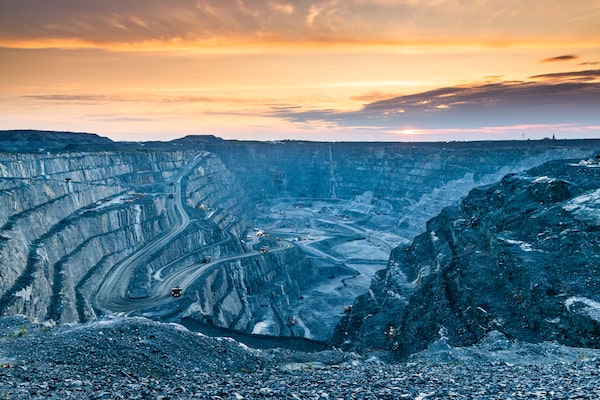
Canadian Malartic, 25 km west of Val-d’Or, northwest Quebec. Operated by Agnico Mines Ltd. On March 23, Quebec ordered all non-priority businesses to temporarily minimize operations to help reduce the risk of spreading the novel coronavirus.Handout
Mines in Quebec are ramping up after restrictions that kept operations to a minimum over the past three weeks were lifted, bringing the province in line with some other parts of the country that allowed mining to continue during the COVID-19 pandemic.
On March 23, Quebec ordered all non-priority businesses to temporarily minimize operations to help reduce the risk of spreading the novel coronavirus. Under the directive, mining companies that operate in Quebec had to put their sites on care and maintenance. The province has the highest number of COVID-19 cases and deaths in the country.
Quebec stood out from several other mining-heavy jurisdictions in Canada, such as Ontario and British Columbia, which both deemed the sector an essential business. Those provinces allowed mining companies to continue to operate, albeit under tougher guidelines that raised the costs of doing business.
However, Quebec changed course on Monday, putting mining on its list of priority businesses. The province said in a release that the decision was motivated in part by a realization that the sector is a necessary part of the supply chain for many essential products, including medical devices.
But the province was also under pressure from the industry, and it noted how important mining is to the province’s economy. Quebec says the sector employed 40,000 people last year and accounted for an average of $7.4-billion of provincial GDP over the past five years.
George Burns, chief executive officer of Eldorado Gold Corp., said mining companies, together with the Québec Mining Association, had been in steady dialogue with the provincial government over the past few weeks. The goal was to hammer out an agreement to reopen sites with the understanding that restrictions would be put in place to protect the health of workers.
“All that communication was effective in convincing the authorities that the mining industry does have the appropriate controls in place to manage the COVID-19 risk,” Mr. Burns said.
To limit travel, those controls include reducing the number of so-called “fly-in-fly-out" air shuttles and extending shift schedules so that workers stay longer at individual sites. Strict physical-distancing procedures are also being put in place to help reduce the chance of the virus spreading.
Eldorado has installed special thermal cameras at its Lamaque gold mine in Val-d’Or that automatically take the temperature of workers coming into its mine site. The company is also reducing the number of people who operate site vehicles and there are new rules about showering and the need to change clothing when exiting mines.
At Agnico Mines Ltd., which operates Canadian Malartic, the biggest gold mine in the country, the start and finish times for shifts will be staggered to reduce congestion. The number of people allowed to travel down in each cage that lowers workers into the company’s deep underground LaRonde mine in Quebec will be cut in half to aid physical distancing.
The recommendations from the province mean the cost of business will climb, and mines will be less productive than before. Agnico’s chief executive officer Sean Boyd acknowledged this is the “new reality,” but also a necessary step. Agnico will take two to three weeks to ramp up in Quebec.
“The worst thing we can do is rush this,” Mr. Boyd said. “This is about a measured steady ramp-up that protects our employees.”
Elsewhere in the country, even without explicit rulings to minimize operations, some mining companies had already shut down production or drastically scaled back operations in areas where the potential for a virus spread was elevated, or at sites that don’t have ready access to major hospitals.
Last month, to protect the health of its employees, Teck Resources Ltd. announced it would reduce its crews by up to 50 per cent at its four mines in B.C. that extract steelmaking coal. Alamos Gold Inc. temporarily suspended production at a gold mine located in the small community of Dubreuilville, in northern Ontario.
Regardless of the jurisdiction, the costs to keep workers safe are creeping up across the country.
“For sure it will cost more to produce in these conditions. There’s no doubt it will cost more,” said Josée Méthot, president of the Québec Mining Association.
"Each mining company will make their own decision, they’ll evaluate whether they accept the added costs and whether they are able to work under these new conditions,” she said.
Editor’s note: An earlier version of this story said Teck Resources Ltd. was reducing production at four mines in B.C. by 50 per cent. In fact, the company is reducing its crew by 50 per cent.
Your time is valuable. Have the Top Business Headlines newsletter conveniently delivered to your inbox in the morning or evening. Sign up today.
 Niall McGee
Niall McGee Nicolas Van Praet
Nicolas Van Praet